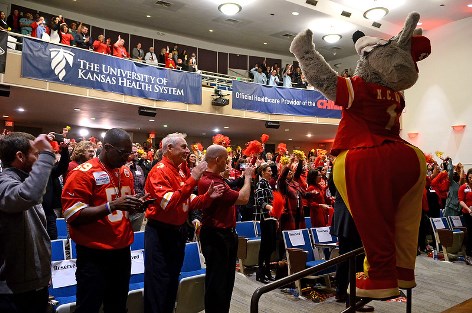A possible case of the 2019 novel coronavirus has been reported in a Lawrence area resident, according to a news release from the Kansas Department of Health and Environment.
A Douglas County resident is currently in isolation at a Lawrence hospital as a precaution, health authorities announced.
The patient, who is not severely ill, traveled to Wuhan City, China, and returned to the United States within the last two weeks, authorities stated.
There is an outbreak of the novel coronavirus strain in Wuhan.
The patient had symptoms in recent days and sought health care on Monday, according to the KDHE. However, the person has not been diagnosed with 2019 novel coronavirus. Specimens are being sent to the Centers for Disease Control and Prevention, and KDHE expects to receive results later this week, according to a spokesman.
“While we have not confirmed this as a case of the 2019 novel coronavirus, we believe it is important to keep the public informed and educated on this new virus,” the KDHE spokesman stated in the news release.
The KDHE is working with the CDC, Lawrence Memorial Health, and the Lawrence-Douglas County Health Department to identify and contact all of those who may have had contact with the individual, so they can begin monitoring them for fever and respiratory symptoms if this is a confirmed case, according to the spokesman.
The 2019 novel coronavirus spreads through the air when an infected person coughs or sneezes, according to the KDHE. Symptoms are thought to appear within two to 14 days after exposure and consist of fever, cough, runny nose and difficulty breathing.
Those considered at risk for contracting the virus are individuals with travel to Wuhan City, Hubei Province, China, or individuals in close contact with a person infected with the 2019 novel coronavirus.
The KDHE spokesman stated that the flu and other respiratory diseases are circulating in the state. The KDHE is recommending everyone get a flu shot and follow basic prevention guidelines.
Standard recommendations to prevent infection spread include regular hand washing, covering mouth and nose when coughing and sneezing, and staying home when sick, according to the KDHE.
The best ways to prevent the spread of respiratory viruses:
• Wash your hands often with soap and water for at least 20 seconds. If soap and water are not available, use an alcohol-based hand sanitizer.
• Avoid touching your eyes, nose, and mouth with unwashed hands.
• Avoid close contact with people who are sick.
• Stay home when you are sick.
• Cover your cough or sneeze with a tissue, then immediately throw the tissue in the trash.
• Clean and disinfect frequently touched objects and surfaces.
Anyone who has recently traveled to Wuhan, China, and has developed fever with respiratory symptoms within 14 days of their travel or have had contact with someone who is suspected to have 2019 novel coronavirus, should stay home and call their health care provider. They also may call the KDHE epidemiology hotline at 1-877=427-7317 if they believe they may have been affected.

